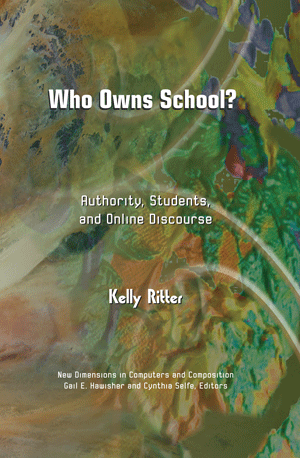Who Owns School?: Authority, Students, and Onlne Discourse (Kelly Ritter) | |
|  | Quantity in Basket:none
Code: 1-57273-953-3
Price:$23.95
Title: Who Owns School?
Sub-title: Authority, Students, and Onlne Discourse
Author(s): Kelly Ritter
Publish Date: February 2010
Pages: 212
Format: Paper
| |
| This volume examines the ways in which college students engage in online disucssions about, and debates over, their relative authority in postsecondary literacy education. Spotlighting sites of online extra-institutional discourse that challenge what faculty believe about the interconnected acts of reading and writing, as well as the purposes of teacher evluation, this book argues that while college faculty frequently enact student-centered pedagogies, and just as frequently employ various technologies in their teaching, non-“academic” technologies continue to be the most active venue for student discourse about education. Though many teachers strive to empower their students via liveratory or critical pedagogies, particularly in first-year writing and reading-based courses, many of these students still feel sufficiently disengaged from their own authority over the learning process as as to seek opportunities to voice this disengagement online, outside the confines of the educational system. As evident on several commercially sponsored or profit-bearing web sites, students express among their peers—which importantly include those living outside one’s home or school communities—trepidation about their relative agencies and ownership of their own education, including their ability to read and interpret texts; write proficiently (or even adequately) in a high-stakes setting; and be heard as valid participants in education reform/teacher evaluation.
Contents: Introduction: School for Sale. WHO NEEDS TEACHERS?: THE GENERATION AFTER LIBERATORY PEDAGOGY. The Limits of Liberatory/Critical Pedagogy. Richard Miller and Liberatory Pedagogy: As If Learning Mattered. Technology Without Teachers: Moving Past Liberatory Pedagogues. Conclusion: “World Have Your Say”. TO READ OR NOT TO READ: ONLINE LITERACY INTERFACES AND PINKMONKEY.COM. Reading Without Teachers: Defining the Terms. Reading Methodology and Community Practices. Textual Sanctity: Online Interfaces and Community-Based Reading Analyses. Addressing the Gap: Technology and Literacy in the Classroom. NEGOTIATED IDENTITIES: ONLINE PAPER MILLS, STUDENT AUTHORSHIP, AND FIRST-YEAR COMPOSITION. Plagiarism and the Student-Teacher-Internet Dynamic. Invisible Agencies: Student Authors versus “Real” Writers. Perceptions of Plagiarism: Two Institutions, Seven Years—Little Difference. Everything’s For Sale: Academic Meets Consumer Culture Online. Conclusion: Ask the Student-Author(s). (E)VALUATING LEARNING: RATE MY PROFESSOR AND PUBLIC RHETORICS OF PEDAGOGY. Valuing Evaluation. Public Pedagogy Meets Public Discourse Online. Transcending Virtual Boundaries: Bridging RMP Discourse and Classroom Conditions. THE WORK OF TEACHING IN THE AGE OF ONLINE LITERACY REPRODUCTION. Casting Aside the Rebels: Pedagogical Conformity and Interchangeable Teacher-Figures. The Mechanized Teacher: The Teaching Machine Movement. The Simulated Teacher: Reproducible Pedagogies and Systematic Emulation. It’s Them or Us: The Separatist Teacher and the Myth of Student Collaboration. Reconciling the Replication: Coming to Terms with Extra Institutional Technologies as Sites of Productive Public Literacies. Notes. Works Cited. Author Index. Subject Index. |
| |







